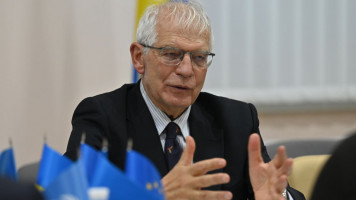Hamas confirms 'indirect exchange of ideas' with Israel
Hamas confirms 'indirect exchange of ideas' with Israel
Israel and Hamas have been holding indirect contacts, reportedly via European envoys in Qatar, about a long-term ceasefire in Gaza.
3 min read
Following the Gaza war in 2014, Hamas is now reportedly seeking a truce [Getty]
Israel and Hamas have been holding indirect contacts about ideas for cementing a long-term truce in the Gaza Strip, sources in the Islamist movement have said.
The contacts have gone through a number of Arab and European channels in a bid to solidify an informal ceasefire agreement that took hold last August, ending a 50-day war in Gaza.
"There has been indirect contact between Israel and Hamas, messages passed via Arab channels as well as through European and Turkish sources," one of the sources told AFP, describing it as "an indirect exchange of ideas".
The contacts were also reported by an Israeli source.
The Egyptian-brokered truce came into effect on August 26, with the sides pledging to resume indirect contacts within a month to pin down a lasting ceasefire and discuss crunch issues.
But the follow-up talks were delayed several times and never formally resumed.
"We are ready for an agreement. Hamas wants to solve the problems in Gaza," the source in the Islamist movement said.
But he insisted the contacts were purely informal and that there was no formal initiative or proposal on the table.
"Hamas has received some European envoys in Gaza and Doha with messages from Israel.
"We received several envoys but it's not officially talks. It's indirect ideas and communication," he said, noting the involvement of a UN official as well as members of the European parliament.
Asked about the indirect contact with Hamas, an Israeli source confirmed there had been some discussions.
"There are contacts with Egypt and other elements over an easing of the blockade and the entry of materials to Gaza in exchange for quiet," he told AFP.
"But Hamas is finding it difficult to control Islamic Jihad and other elements in order to do this," he said, referring to a flurry of sporadic rocket fire from Gaza, most of which have been claimed by a small Islamic extremist group bent on challenging the ruling Hamas movement.
The Hamas source said senior members of the movement had met in Doha over the weekend for talks with the Qataris, while denying remarks attributed to a senior Hamas official which suggested there was a written proposal under discussion.
He said the discussions were about an agreement of five to 10 years, and focused on key issues for Hamas such as ending Israel's blockade, which is now entering its ninth year, and the establishment of a sea passage between Gaza and the outside world.
He did not say whether other Palestinian factions were involved in the talks, such as the Fatah movement of president Mahmud Abbas which was heavily involved in the Egyptian-brokered talks that ended the conflict.
The war killed 2,200 Palestinians, half of whom were civilians, UN figures show. On the Israeli side, 73 people were killed, most of them soldiers.
Earlier on Tuesday, Abbas spokesman Nabil Abu Rudeina said that a long-term truce would be welcome as long as it ended the suffering in Gaza.
"This is important, as long as it is not at the expense of unity of the nation and the people," he said in a statement.
"Any truce must aim to lift the suffering of our people, and must not have as its price a move away from the Palestinian and national consensus."
The contacts have gone through a number of Arab and European channels in a bid to solidify an informal ceasefire agreement that took hold last August, ending a 50-day war in Gaza.
"There has been indirect contact between Israel and Hamas, messages passed via Arab channels as well as through European and Turkish sources," one of the sources told AFP, describing it as "an indirect exchange of ideas".
The contacts were also reported by an Israeli source.
The Egyptian-brokered truce came into effect on August 26, with the sides pledging to resume indirect contacts within a month to pin down a lasting ceasefire and discuss crunch issues.
But the follow-up talks were delayed several times and never formally resumed.
"We are ready for an agreement. Hamas wants to solve the problems in Gaza," the source in the Islamist movement said.
But he insisted the contacts were purely informal and that there was no formal initiative or proposal on the table.
"Hamas has received some European envoys in Gaza and Doha with messages from Israel.
"We received several envoys but it's not officially talks. It's indirect ideas and communication," he said, noting the involvement of a UN official as well as members of the European parliament.
Asked about the indirect contact with Hamas, an Israeli source confirmed there had been some discussions.
"There are contacts with Egypt and other elements over an easing of the blockade and the entry of materials to Gaza in exchange for quiet," he told AFP.
"But Hamas is finding it difficult to control Islamic Jihad and other elements in order to do this," he said, referring to a flurry of sporadic rocket fire from Gaza, most of which have been claimed by a small Islamic extremist group bent on challenging the ruling Hamas movement.
The Hamas source said senior members of the movement had met in Doha over the weekend for talks with the Qataris, while denying remarks attributed to a senior Hamas official which suggested there was a written proposal under discussion.
He said the discussions were about an agreement of five to 10 years, and focused on key issues for Hamas such as ending Israel's blockade, which is now entering its ninth year, and the establishment of a sea passage between Gaza and the outside world.
He did not say whether other Palestinian factions were involved in the talks, such as the Fatah movement of president Mahmud Abbas which was heavily involved in the Egyptian-brokered talks that ended the conflict.
The war killed 2,200 Palestinians, half of whom were civilians, UN figures show. On the Israeli side, 73 people were killed, most of them soldiers.
Earlier on Tuesday, Abbas spokesman Nabil Abu Rudeina said that a long-term truce would be welcome as long as it ended the suffering in Gaza.
"This is important, as long as it is not at the expense of unity of the nation and the people," he said in a statement.
"Any truce must aim to lift the suffering of our people, and must not have as its price a move away from the Palestinian and national consensus."

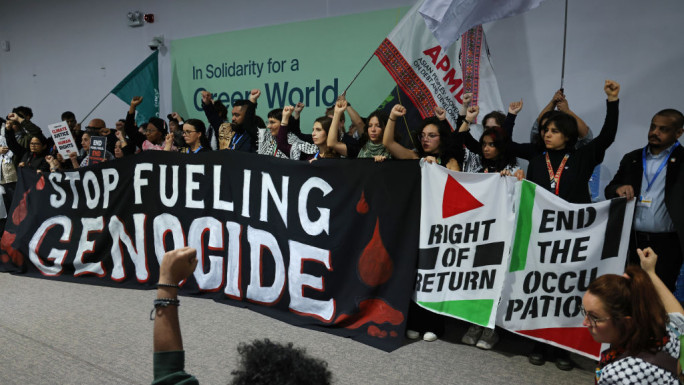
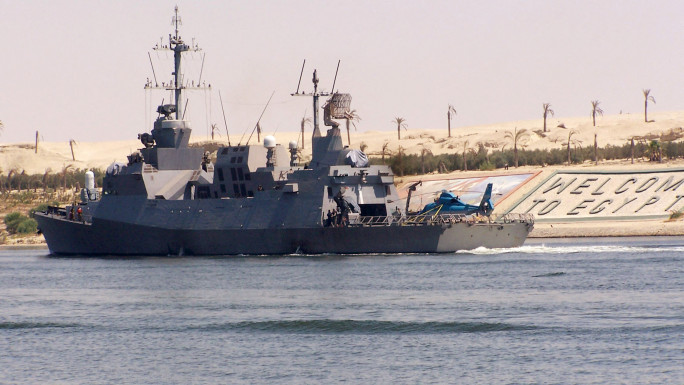
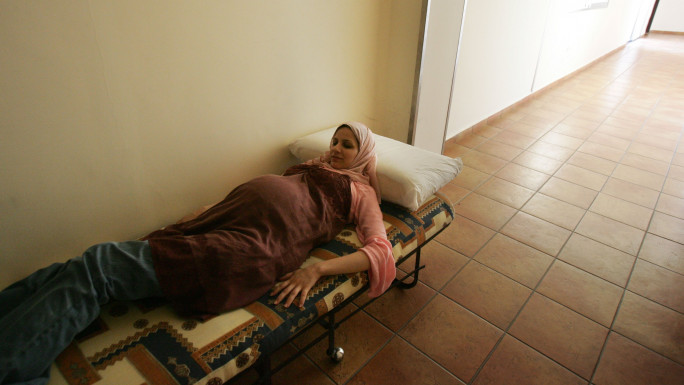
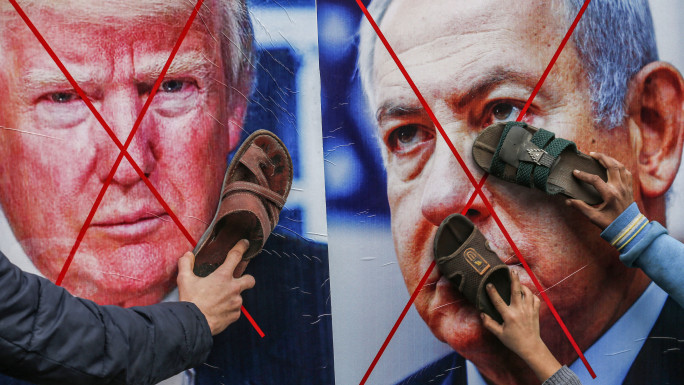
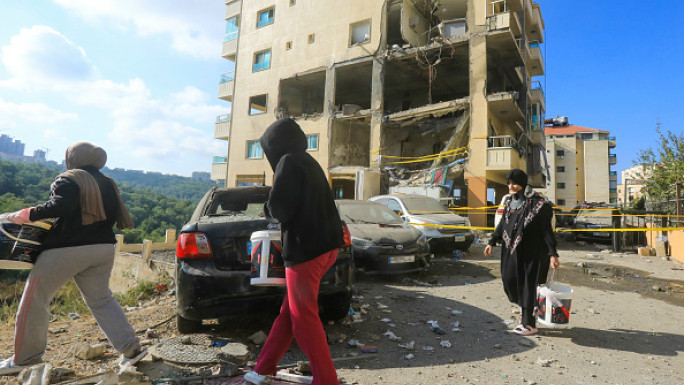
 Follow the Middle East's top stories in English at The New Arab on Google News
Follow the Middle East's top stories in English at The New Arab on Google News
![Gazans reel after Israel strike [Getty]](/sites/default/files/styles/image_330x185/public/2183300682.jpeg?h=a5f2f23a&itok=fN-GAQGE)

